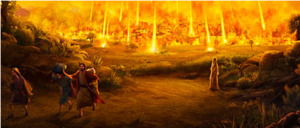 by Rolaant McKenzie
by Rolaant McKenzie
August 18, 2024
Terminator 2: Judgment Day (1991) is the second of six science fiction action films involving an artificial intelligence called Skynet, developed by Cyberdyne Systems and incorporated into the United States nuclear defense network, waging a war of annihilation against humanity since it became sentient on August 29, 1997, and responding to attempts to deactivate it by initiating a nuclear holocaust, which came to be called “Judgment Day” by the survivors.
Thirty-two years later, as the human resistance under the leadership of John Connor was on the verge of defeating Skynet and its mechanical forces, Skynet sought to avoid its demise by sending back in time to Los Angeles in 1995 a T-1000 cyborg terminator disguised as a man to kill John Connor when he was a child. At the same time, the resistance was able to send back a reprogrammed T-800 cyborg terminator to protect the young Connor.
 John’s mother, Sarah, in 1995, due to her efforts to warn people about and prevent the upcoming “Judgment Day,” was being held in the psychiatric ward at the Pescadero State Hospital. John and the T-800 rescue her and flee south to the desert ranch of a friend near the Mexican border for a short rest and to consider hiding in Mexico.
John’s mother, Sarah, in 1995, due to her efforts to warn people about and prevent the upcoming “Judgment Day,” was being held in the psychiatric ward at the Pescadero State Hospital. John and the T-800 rescue her and flee south to the desert ranch of a friend near the Mexican border for a short rest and to consider hiding in Mexico.
Later, as Sarah slept, she dreamed it was August 29, 1997, and she was at a park in Los Angeles on a beautiful sunny day. Children were playing on the playground, their parents were preparing a picnic lunch, and a man was relaxing on a park bench reading the newspaper. Sarah approaches a chain link fence that is between her and the playground and starts shouting at the people to run away from this place because sudden destruction is about to fall on them. No one heeds her pleas, and a nuclear bomb explodes in the distance over Los Angeles, destroying the city and everyone at the park.
The nightmare Sarah experienced motivated her to continue her efforts to warn about the upcoming disaster and work to avoid it. This part of the movie was reminiscent of another situation where a man was warned of an imminent “Judgment Day” coming to the city where he and his family dwelled.
Lot moved to Sodom to take advantage of the surrounding fertile pasture lands for his immense flocks and herds after the area he shared with his uncle Abraham became too small to sustain them (Genesis 13). As his family settled into their new home, they became aware of the wickedness of the city, but they gradually adjusted to its culture. Lot, being a righteous man, was distressed by the lawlessness, violence, pride, apathy, complacency, idleness, indifference to the poor, and gross sexual immorality (Genesis 18:20; Ezekiel 16:49-50; 2 Peter 2:6-8; Jude 1:7).
Because of Sodom’s wickedness, God decided to totally destroy this and several other neighboring cities that participated in the same sins. He did not cause Lot to have a dream, but being gracious to him and his family, He sent two angels in the appearance of men to bring them warning to flee the imminent judgment (Genesis 19).
The men of the city, however, saw them being welcomed into the hospitality of Lot’s home. They came en masse to his house, surrounded it, and demanded that the two men be handed over to them so that they could have sex with them. The angels rescued Lot out of their hands and inflicted them with blindness. So great was their depravity that, even blind, they strenuously continued seeking the door of the house to lay hold of the men.
The angels told Lot to gather to himself any other loved ones in the city and flee, lest they be swept away in the punishment of the city. So he urgently sought and found his soon-to-be sons-in-law and pleaded with them to come with him and his family to avoid the impending destruction. But as they looked around them, everything appeared as it always had. People were eating, drinking, partying, and entertaining themselves. So they thought Lot was mad, that he was joking, did not heed his message, and remained in the city.
“Judgment Day” came in the morning, and the angels took Lot, his wife, and two daughters out of the city and told them to flee. Once away, fire and brimstone fell on the city and destroyed its inhabitants.
In a July 19, 2012, article entitled “My Heart Aches for America,” Christian evangelist Billy Graham related something his wife told him as she was reading the draft of a book he was writing. She said, “If God doesn’t punish America, He’ll have to apologize to Sodom and Gomorrah.” Variations of this statement have since been repeated by Graham and many other evangelists and pastors. Looking at Romans 1:18-32 and considering how American and much of Western culture reflects this passage and the culture of Sodom, it is not difficult to understand this as a true statement.
Jesus described the kind of normalcy bias that Lot’s prospective sons-in-law and the other residents of Sodom exhibited that would exist when He returns.
“In the days of Lot: they were eating, they were drinking, they were buying, they were selling, they were planting, they were building; but on the day that Lot went out from Sodom it rained fire and brimstone from heaven and destroyed them all. It will be just the same on the day that the Son of Man is revealed.” (Luke 17:28-30)
Out of His love for sinners separated from God and headed toward a catastrophic judgment day worse than a nuclear holocaust, Jesus did not send angels to rescue us. He came Himself to pay in full our sin debt by dying on the cross and rising from the dead. Jesus urgently bids us to heed His warning and flee the wrath of God to come by trusting in Him (1 Thessalonians 1:10; Revelation 19:11-21).
© 2024 Rolaant McKenzie – All Rights Reserved
E-Mail Rolaant McKenzie: rolaant@gospeloutreach.net
Website: http://www.gospeloutreach.net/




